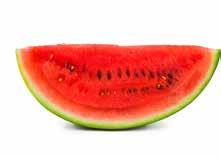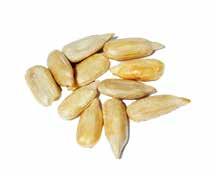
2 minute read
PROTECT YOUR SKIN FROM THE INSIDE OUT
Protect your skin
from the inside out
When summer hits and we spend longer days outside, we’re reminded how detrimental a hot, sunny day can be to our skin. While we should always apply – and reapply – sunscreen, there are a number of foods that can actually improve your skin's ability to protect itself against harmful rays when consumed on a regular basis.
Vitamin A Lutein
• Essential skin vitamin that curbs
UV damage and slows signs of aging, protecting against suninduced redness and pigmentation • Important for cell turnover Try: Asparagus: 1 cup of cooked asparagus contains approximately 1/3 daily value of vitamin A. • Filters blue light and protects your skin against oxidative damage • Antioxidant that protects against UVA and UVB damage Try: Dark leafy greens: Spinach, kale, collards, turnips and mustard greens.
Beta carotene

• Antioxidant that neutralizes free radicals and repairs damaged skin cells • The body converts beta carotene to vitamin A • Associated with protection against sunburn reaction Try: Sweet potatoes: Food highest in beta carotene per cup. Try: Carrots: While coming in with less beta carotene per cup than sweet potatoes, these actually contain more beta carotene per 100 calories, making them a lower-calorie option.
Lycopene
• Absorbs UVA and UVB radiation • Provides photo protection by acting as an antioxidant in the body at the molecular level Try: Tomatoes: The darker the color, the higher the concentration. Cooking tomatoes makes nutrients more readily available for your body. Try: Watermelon: Contains more lycopene than tomatoes, and is composed almost entirely of water, which can aid in hydration.
Consistent consumption (10 weeks or more)
of these foods may help boost your body’s natural sun-fighting abilities.
• Natural building blocks for healthy skin and full of anti-inflammatory properties • May protect against UVA and UVB radiation • Beneficial for fighting dry skin conditions, such as dermatitis, and helping restore skin’s moisture balance Try: Nuts: Walnuts have the highest level of these fatty acids, followed by pecans. Other nuts, such as pine, pistachio, Brazil, cashew and macadamia, also contain these omegas in smaller concentrations.


Water
• Being in the sun or heat causes dehydration, making your skin more prone to damage • The average adult should drink 8 ounces of water per day (or more during periods of heat and sun exposure)
See our article on page 11 about replenishing your electrolytes and staying hydrated.
Vitamin E
• Neutralizes free radical damage, has anti-inflammatory properties and supports a healthy immune response • Beneficial in reducing UV damage to skin and protects cells from oxidative stress Try: Sunflower seeds: Contain one of the highest levels of vitamin E – a whopping 10 mg (1/3 daily recommendation) in just 1 ounce.
Flavanol EGCG, catechins and polyphenols
• Protect against decreasing collagen levels and reduce skin damage from UVA rays
Try: Green or black tea.
Eating certain foods is a good practice to strengthen your body’s natural UVA/UVB defenses but should not be used as a replacement for sunscreen. When used in combination, sunscreen and a healthy diet can dramatically improve your skin's ability to regenerate itself, minimizing fine lines, wrinkles and discoloration associated with sun exposure. Try: Simply Summer Recipes on page 34.






